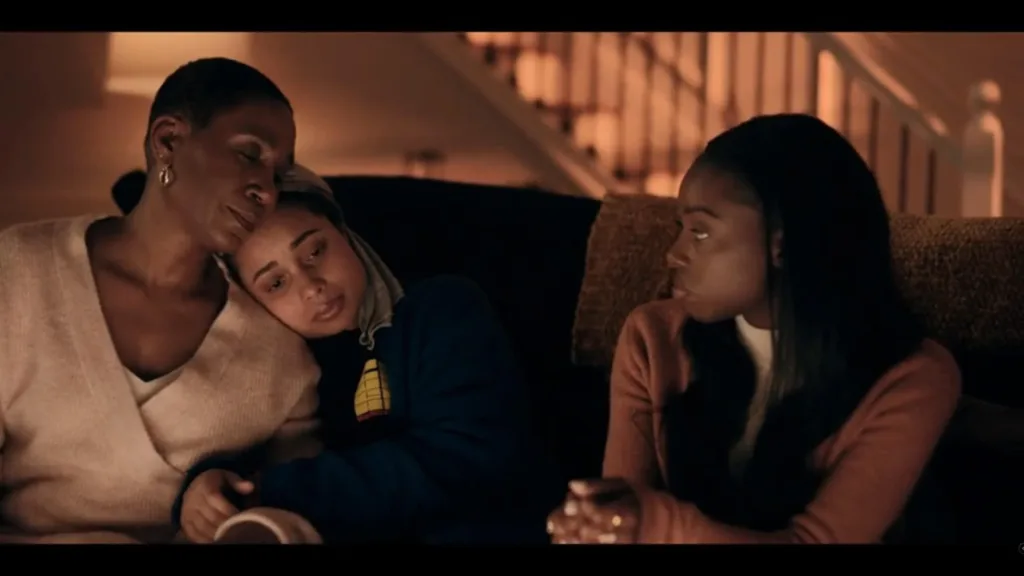The seventh season of “The Chi” opens not with a whisper, but with the pronounced reverberations of a community consistently shaken yet resilient. We return to South Chicago, a space rendered palpable through the screen, now heavy with the twin specters of Douda Perry’s demise and the raw, recent wound of Rob’s murder.
These events are not mere plot devices; they are seismic shifts that reconfigure the landscape, creating a volatile power vacuum in the criminal hierarchy and sending tremors of grief through the interconnected lives the series so diligently portrays. As ongoing narratives pick up speed, the air is thick with an unnerving anticipation, a sense that every character is navigating a re-drawn map of alliances and emergent dangers.
The introduction of seasoned talents like Phylicia Rashad alongside Karrueche Tran and Wendy Raquel Robinson hints at fresh complexities, new matriarchal energies, perhaps, or further catalysts in a world already teetering on the edge.
The Throne Sits Uneasy, The Avenger Walks Blind
In the wake of established authorities crumbling, a new order, or perhaps a more chaotic iteration of the old, scrambles to assert itself. Nuck’s swift, almost chillingly pragmatic consolidation of power within the 63rd Street Mob exemplifies this. His mantra, “63rd over everything,” is less a declaration of loyalty than a stark statement of intent, his methods of ensuring compliance a grim reflection of the ruthlessness required not just to gain, but to hold, such a perilous position.
Juxtaposed against this strategic ascent is Alicia’s descent into a maelstrom of grief. Her singular, burning focus on avenging her son, Rob, transforms her from a figure of wealth and influence into an almost primal force. The series captures a specific kind of maternal rage, one that the structures of society—even its illicit ones—can barely contain.
Nuck’s manipulation of this profound sorrow, directing her vengeance towards the unsuspecting Zay, is a masterstroke of cynical opportunism. Zay, aware of his diminishing standing yet caught off guard by the fatal misdirection, becomes a tragic pawn. Alicia’s execution of Zay, an act born of profound pain and misinformation, offers no catharsis, only the bitter taste of a justice system—be it street or state—that often victimizes the vulnerable in its pursuit of an elusive equilibrium.
Even the church is not immune to these realignments, as Pastor Ezekiel forges a professional, if morally dubious, understanding with Nuck, while his assistant Charles watches with an ambiguous knowingness, suggesting layers of unspoken history and future leverage.
Echoes in Every Home: Personal Reckonings Amidst Chaos
The macro-level power struggles invariably send ripples into the micro-worlds of individual lives, forcing personal reckonings upon a community already burdened. Tiff’s grief over Rob is a quiet storm, her retreat into herself a poignant counterpoint to Alicia’s outward fury. Her reliance on Keisha and Emmett for the care of her son, EJ, underscores the communal webs that, even when strained, attempt to catch those who fall.
The quiet revelation of her pregnancy with Rob’s child adds another layer of profound consequence, a future life tethered to a past tragedy, a recurring motif in narratives that explore cyclical poverty and loss. Elsewhere, the pressure cooker environment of Chicago tests the bonds of love and loyalty; Fatima’s desire to flee the relentless violence clashes with Victor’s deep-rooted, perhaps complicated, commitment to his city and the problematic good he tries to achieve within it, presenting a very contemporary dilemma of place attachment versus self-preservation.
Bakari’s tightrope walk is particularly emblematic of the choices facing young Black men: caught between the immediate, dangerous allure of Nuck’s operation and the tentative promise of a different future offered by Professor Gardner and Alicia’s scholarship. Alicia’s stark reminder that “nothing comes for free” is a chilling commentary on the transactional nature of survival, even for those seeking an exit.
Emmett’s aspiration to become a figure his children won’t be ashamed of, while navigating dealings with Nuck, speaks to the daily compromises made by those trying to build legitimate lives against a backdrop of pervasive illegitimacy. Darnell’s weary observation that “peace is temporary” and the streets “always gon’ have a villain” feels less like cynicism and more like a somber, historically informed prognosis for communities perpetually under duress.
The Unfolding Map: Grief, Cycles, and the Weight of Tomorrow
As “The Chi” moves into its seventh season, it continues to serve as a potent, if sometimes sprawling, examination of how loss permeates the fabric of a community, shaping choices and forging unlikely, often fraught, connections. The series doesn’t shy away from the cyclical nature of street violence, reflecting a societal challenge where escape routes are few and heavily tolled.
Moral complexities abound, with characters making alliances born of necessity rather than affinity, each decision a gamble with potentially devastating stakes. The intricate web of relationships means that personal tragedies inevitably become communal burdens, and power plays at the top cascade downwards with alarming speed.
Within this framework, the tension between despair and the persistent, almost defiant flicker of hope for something better becomes a central thematic concern. The unexploded ordnance of secrets – Bakari’s knowledge of Nuck’s deceit, Tiff’s pregnancy – promises further eruptions, ensuring that the landscape of South Chicago will remain a contested, dynamic, and deeply human space on our screens.
The show’s continued existence on a major streaming platform, telling these specific, nuanced stories, speaks to a slow but vital shift in what kinds of narratives are deemed worthy of mainstream attention and investment.
The Chi Season 7 premiered on May 16, 2025, on Paramount+ with Showtime and on May 18, 2025, on Showtime.
Full Credits
Creators: Lena Waithe
Executive Producers: Lena Waithe, Common, Elwood Reid, Aaron Kaplan, Rick Famuyiwa, Ayanna Floyd Davis, Justin Hillian, Jet Wilkinson, Shelby Stone, Derek Dudley
Showrunners: Justin Hillian, Jewel Coronel
Writers: Lena Waithe, Justin Hillian, Jewel Coronel, Racquel Callahan, Resheida Brady, Kristiana Rae Colón, James Rogers III, Mia A. Brumfield, Whitney Beckwith
Directors: Nancy C. Mejía, Katrelle N. Kindred, Rashaad Ernesto Green, Anthony Shim, Johnson Cheng, Malakai, Deondray Gossfield, Quincy LeNear Gossfield
Producers: Common, Derek Dudley, Rick Famuyiwa, Aaron Kaplan, Shelby Stone, Lena Waithe, Chris McGinn, Jewel Coronel
Cast: Jacob Latimore, Michael V. Epps, Shamon Brown Jr., Yolonda Ross, Birgundi Baker, Luke James, Curtiss Cook, Lynn Whitfield, Hannaha Hall, Tyla Abercrumbie, Genesis Denise Hale, Judae’a Brown, Tai Davis, Miriam A. Hyman, Jason Weaver, Ahmad Nicholas Ferguson, Zaria Imani Primer
Composer: Patrick Warren
The Review
"The Chi" Season 7
"The Chi" Season 7 continues its vital, if sometimes dense, exploration of a South Chicago grappling with loss and systemic pressures. It excels in portraying the raw humanity within cycles of violence and precarious hope, offering a layered look at community resilience. While its sprawling cast demands attention, the series remains a significant, unflinching narrative.
PROS
- Nuanced portrayal of grief and its varied impacts.
- Compelling exploration of power dynamics and moral compromises.
- Strong ensemble cast bringing depth to interconnected storylines.
- Relevant social commentary on community and systemic challenges.
- Highlights resilience and the search for hope amidst adversity.
CONS
- The sheer number of characters and plotlines can occasionally feel overwhelming.
- The relentless nature of conflict might be intense for some viewers.
- Pacing can vary across different character arcs.
















































